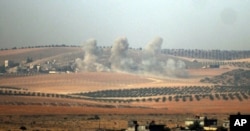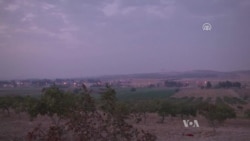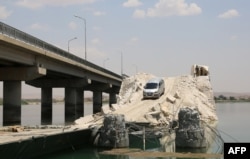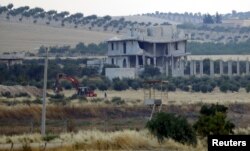The victory in Jarablus was as stunning as it was swift.
Less than 10 hours after Turkish tanks first crossed the border to meet up with Syrian rebels Wednesday, social media was full of selfies and videos showing the joint force in charge of a ghost town.
Some Islamic State terror group flags and signs still adorned walls and buildings. But as the Syrian rebels marched through the streets, there was little evidence of the hundreds of IS fighters and family members who, according to U.S. military intelligence, were inside of Jarablus before the Turkish operation began.
U.S. officials said it appears the overwhelming majority of them fled.
"ISIL's top priority is its own survival," a U.S. counterterrorism official told VOA on condition of anonymity, using an acronym for Islamic State. "The group has shown it will opt to flee and fight another day when faced with overwhelming force."
Whatever resistance IS fighters may have tried to mount seems to have been minimal, especially compared to the vigorous and desperate defense the group put up in nearby Manbij less than two weeks before.
"This is another important milestone," Pentagon spokesman Peter Cook told reporters Thursday. "ISIL has largely been forced out of the city."
Cook said the town that once was a "focal point for foreign fighter flow," helping to fill IS ranks, finally slipped from the terror group's grasp.
Watch video report from VOA Pentagon correspondent Carla Babb:
Lingering fear
Still, U.S. officials remain uneasy that the fight in both Jarablus and Manbij is not yet over.
"ISIL operates, in part, as an insurgent group which has proven adept at conducting guerrilla-style attacks," said the U.S. counterterrorism official.
Pentagon officials also have raised the possibility that IS fighters could try to infiltrate one or both of their former strongholds. And they noted that in Jarablus, clearing operations for both fighters and IEDs (improvised explosives devices) were still ongoing.
"The Jarablus operation was certainly an anomaly for coalition forces, as ISIS essentially conceded one of its last strategic border towns with Turkey," said Nicholas Glavin, a senior researcher at the U.S. Naval War College's Center on Irregular Warfare and Armed Groups. ISIS is another acronym for the terror group.
"I think ISIS is making a strategic calculation that it cannot hold the same amount of territory effectively as it had just two years ago," he said. "We're learning that ISIS is willing to concede territory and coalesce its efforts toward survival, not expansion or governance."
IS movement
It is a strategy that has worried U.S. officials for months.
Even before the start of the Turkish-led effort to take Jarablus, U.S. military officials were keeping a close eye on IS movements, dedicating extra resources to track the terrorist fighters as they fled Manbij to Jarablus, many trying to protect themselves by using civilians as human shields.
That type of surveillance is unlikely to have stopped. But there is still a high level of concern that IS will find a way to leverage its contacts in the region's black markets and criminal networks to help ferry its fighters out of harm's way.
Some fighters also may find refuge among civilians who sympathize with the group, or who simply remain distrustful of Syrian rebel or Turkish forces.
Just as worrisome to some is the possibility that IS may use to its advantage the tensions between the Turks and the Kurdish forces that took Manbij.
"What Turkey has done is give ISIS the space to regroup," cautioned Michael Pregent, a former intelligence officer now with the Hudson Institute. "They basically halted the Kurdish forces from destroying ISIS."
He said the Turkish takeover of Jarablus was simply too easy, "like dipping your toe in a pool," for the loss not to be an IS concession.
"ISIS certainly benefits from Turkish-Kurdish fighting," said Patrick Skinner, another former intelligence officer.
But Skinner, now with The Soufan Group, a provider of strategic security intelligence services, thinks that even if the terror group is able to buy time and space to regroup, it will not be able to make up for the loss of such a strategic hub.
"Turkey might be in turmoil, but it's more than capable of taking whatever town they want from ISIS along the border region," he said. "It's impossible to completely seal off a border as long and well-traveled as Turkey-Syria, but it's getting closer to being practically closed off."
VOA International Correspondent Sharon Behn and Pentagon Correspondent Carla Babb contributed to this report.









